Coping With COVID in the Holidays
Air Date: Week of December 10, 2021
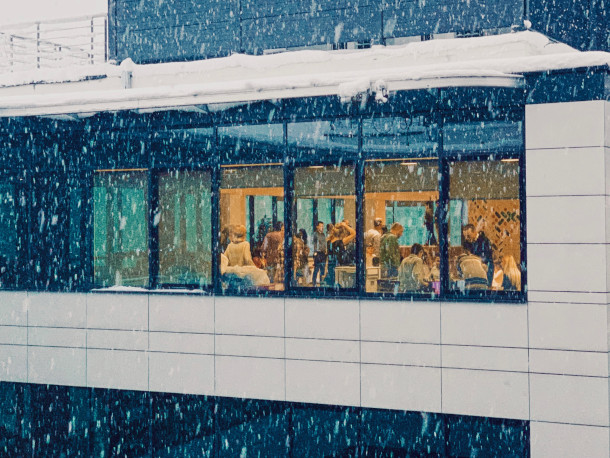
As winter approaches, many are wondering how to safely gather indoors during this era of the pandemic. (Photo: Igor Spasic, Flickr, CC BY 2.0)
As Americans prepare to travel and gather in the winter holiday season, we consider how to do so safely in this era of the pandemic. Hosts Steve Curwood and Bobby Bascomb talk to public health expert Joe Allen of the Harvard T.H. Chan School of Public Health on the best practices for keeping safe during this time of year.
Transcript
CURWOOD: From PRX and the Jennifer and Ted Stanley Studios at the University of Massachusetts Boston, this is Living on Earth. I’m Steve Curwood.
BASCOMB: And I am Bobby Bascomb. And with the end of the year fast approaching, when you know, lots of Americans will be traveling around the country and getting together for family gatherings. And of course, it's important to know how exactly to do that safely with the pandemic these days.
CURWOOD: Yeah, we've been talking about this, Bobby. So, we thought we would just follow up on this question with Joe Allen. Joe teaches exposure assessment science at the Harvard TH Chan School of Public Health. And he's on the line with us now. Hi, there, Joe.
ALLEN: Hi, Steve, Bobby. Great to be back with you.
CURWOOD: Yeah, great to have you back. By the way, since the last time we talked to you, I noticed you've added a few things to your resume. You're now chair of the Lancet COVID-19 Commission Task Force on safe work, safe schools and safe travel, in addition to directing Harvard's Healthy Buildings program, so congratulations.
ALLEN: Well, like everybody in our field of public health of medicine, it's been quite a busy two years and the Lancet work really lets us connect with scientists from all over the world to make sure that the best science is getting out there into people's hands so they can make good decisions at home at work at school.
CURWOOD: So, let's start with one of the questions that Bobby and I were discussing, really, as we're thinking of you, and a lot of people are thinking about this. So, if someone is looking to travel for the holidays, or have people visit who will have to travel to get there, how safe is it for them to be on a plane or another form of mass transit?
ALLEN: Well, I think the first thing we have to do when we think about this is differentiate risk based on a couple key factors, 1.) vaccination status and 2.) age and you know, your immune history and whether or not you’re immune compromised. So, if you're vaccinated and boosted at this point, I think some of this travel is perfectly okay. And your risk is low. In fact, I've been traveling a lot more these past couple months and feel okay. I'm vaccinated, boosted. If you're not vaccinated, clearly, you need to be vaccinated. I mean, we see the vast risk differences in terms of just getting any infection. And if you do get infected, you're high risk, and you will get infected at this point. Delta is so transmissible. We're all going to be exposed at some point. And that virus is going to find your immune system naive, or primed and prepped and ready because you've been vaccinated. So, let's get to your question, though about you know, air travel and some of the specifics. Actually, think we're overestimating the risk of transmission on airplanes. And I don't just think it I've studied this for over a decade. Wrote an article in the Washington Post in early 2020, at the pandemic, when it was just getting started, saying, you don't get sick on airplanes, really. And I think that's surprised a lot of people. I'm happy to talk about why that's the case. But maybe just that is the starting point.
CURWOOD: Well, right. I mean, you get sick in the crowd of people trying to get on the airplane, right, Joe?
ALLEN: Well, that's exactly right. We get sick when we travel, but it's not necessarily in the airplane. So certainly, think about what happens when you travel, right, Steve. You don't sleep well, maybe you're changing time zones, you're mixing with people all over the place bus, subway, a taxi, Uber, security line. Turns out on the airplane, though, when you're sitting in your seat, air quality is very good, because you get a high, what we would call, air exchange rate, maybe 10 or 20 air changes per hour. And for reference, your home is about half an air change per hour. And all of the recirculated air is going through HEPA filters. So, the highest grade filter we have and delivered right at your row and returned out by your feet. So, you know, it's been born out in the science, we've known this for a long time, that if airplanes were this high risk environment, we'd see outbreaks all the time on airplanes. And the fact is, we have billions of travelers, and it can happen, but it's really rare. Now, I just want to flag one thing quickly, during boarding, the ventilation system isn't always running. That's probably the highest risk time when you're… when you're getting on an airplane.
CURWOOD: Yeah, thank God they now fine the airlines if they leave you sitting on the ground for a long time waiting to take off. Bobby, you were talking about what people should do before you get on these planes. Right?
BASCOMB: Yeah, I mean, what steps can somebody take before you travel to sort of, you know, mitigate your risk?
ALLEN: Yeah, Bobby, so the things first, and again, I'm gonna probably, a broken record here, get vaccinated, get boosted. That's number one. That's our top line defense. Second, wear a high-quality mask. And you know, we're well past the stage here, if like any mask will do or just find a cloth mask, you should be wearing a good mask, right? There are N95’s, people have now heard about this. KF94’s is the one I like to wear. It’s a Korean based mask that’s high filter efficiency. And remember the ability of the mask to stop aerosols, what we emit from our lungs, or what other people emit from their lungs that we don't want to breathe depends on the two apps, filtration and fit. So, the N95 designation is the filter efficiency, 95%. Fit is the other part. It's got to be over your nose, flush against your face or else the aerosols are just escaping. So, get vaccinated, get boosted. And then wear a high-grade mask. And you'll be you know, that's about as low risk as you can get.
CURWOOD: What do you mean by Swiss cheese model of protection? I've heard that expression kicked around. What are people talking about?
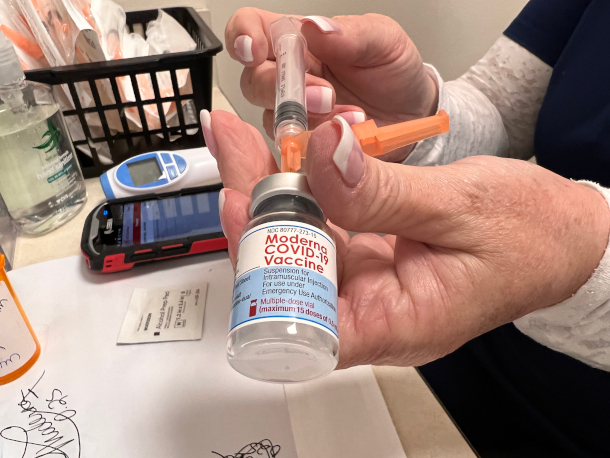
Vaccines and boosters are the most important method of protection for COVID-19. (Photo: Anthony Quintano, Flickr, CC BY 2.0)
ALLEN: Yeah, we've been talking about this since day one of the pandemic really that no one strategy in and of itself is sufficient. So, you want to layer the defenses. And the idea is like Swiss cheese, it has holes in it. But if you layer up enough of these slices of defense, even though some have holes, the virus has a hard time getting through all of them. So, the layers here, the Swiss cheese or vaccinations, boosting, you wear a mask, good ventilation and filtration. You layer enough of these and we can really reduce risk. And in fact, Steve, we've seen this, in every environment, even pre-vaccines. If you have these set of controls in place, this layer defense controls the Swiss cheese model, we can drive down risk, even in the highest risk settings, even like hospitals.
BASCOMB: Now, what about people that can't get vaccinated? I have a four-year-old daughter who's just not eligible yet to receive the vaccine. Is it safe for her to travel or for that matter, to go to holiday parties, be around people that aren't in her usual network?
ALLEN: Yeah, that's a great question. And so maybe starting with risk is subjective, and that, but I'll answer why I think that'd be fine. And I've been advising people in my family who have kids under five, who are not vaccinated that it's okay to do these things. First, the risk to kids is quite low, thankfully, for this virus. And it has been since day one, continues to be the case. And if you want to protect your kids under five who can't get vaccinated, protect them best, the thing to do is get everyone around them vaccinated. All the adults in the house, their siblings, if they have older siblings should be vaccinated. And if you're doing things like travel in these higher risk places, densely occupied spaces, or if you're worried about air travel, they could be wearing one of these high-grade masks.
BASCOMB: And, you know, a lot of people, ourselves included, you know, the Living on Earth, we're thinking about having a holiday party coming up. What are the best practices for groups of people gathering together like that? I mean, should we be opening all the windows and putting on a jacket to get fresh air in there or you know, is cranking up the heat to kill the virus maybe a better approach? What do you recommend?
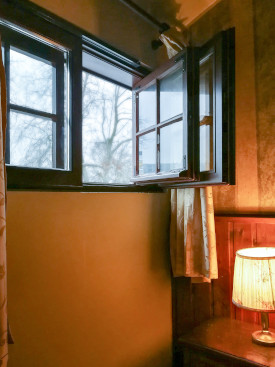
Open windows increase ventilation and slow spread of any virus particles in the air during an indoor gathering. (Photo: Tetiana Shyshkina on Unsplash)
ALLEN: Yeah, a couple things. So first, we'll start again, everyone should be vaccinated, boosted. I like that. Second, yeah, absolutely. We should be increasing the ventilation and filtration. So, think of it this way, right? We have very little, if any spread happening outdoors. Why is that? Unlimited delusion, unlimited ventilation, this is an indoor problem. So, if you make the indoors a little bit more like the outdoors, pop open a window, if you can, my window right here is open just a little bit, bring in more fresh outdoor, use some of these portable air cleaners with better filtration, that goes a long way into reducing the overall respiratory aerosol load, or the amount of virus that could be in the air if someone was infectious. So, you do those things, you're going to be in pretty good shape, cranking up the heat isn't going to do all that much, make you more comfortable, but it's really not going to do much for the virus. Another strategy you could deploy, which I think is really smart has been underutilized throughout the entire pandemic, since they've been available, are these rapid tests, these rapid antigen tests that you self-swab, put in a little kit gives you an answer in 15 minutes, it tells you if you're actively infectious. So, you could imagine your holiday party, everyone's vaccinated, boosted, maybe there's some young kids who are not vaccinated, maybe someone hasn't had a chance to get boosted. You could deploy these rapid tests. They're relatively inexpensive. And it'll tell you in that moment, are you infectious, if people are negative on that test, you can feel quite good and quite confident that you don't have you know, the potential of introducing someone who could spread to others at that moment.
CURWOOD: Let me take you back on the… on the heat question, though, I thought that the virus doesn't like very warm places, and doesn't like a lot of humidity, I think, tell me, what's the situation there.
ALLEN: We do better when the indoor humidity is around 40 to 60%. And it could be due to a couple different reasons. The first is our defenses and our respiratory system, our lungs, function better when the humidity is in that range for the simple reason that the cells in our lungs are ciliated cells, and they have mucus on them, and they're capturing things out of the air all the time. And those cilia are constantly beating and bringing up things that are captured where we swallow them harmlessly. Well, when it's lower humidity turns out, the cilia beat less often and less frequent, and you have less mucus. So, your respiratory system has less defense when it's not that humid. The other thing that's happening that is important is about how the virus spreads through the air. So, when we talk, sing, cough, we're constantly getting these respiratory aerosols, when it's dry, the larger droplets shrink because of evaporation. When they're smaller, they travel farther in the room, and they stay aloft longer. So, if the humidity is lower than 40%, you could expect more long range transport of the virus. So relative humidity turns out is really quite important. Temperature has a smaller effect. I think it's a little less well understood in terms of the impact. And I'd say even as we think about relative humidity, the most important building level strategy you can do is that ventilation and filtration are going to be more important than humidity or temperature and any of these things that I think operate, they're important, but they operate a little bit more on the margins. Think about it this way, right? We think about these respiratory aerosols, like cigarette smoke, you could influence how long that smoke lingers in a room through temperature, humidity, maybe modifying sunlight and these other these other factors. All of these things matter and they're all acting together, of course. But I think we think about the top line control strategy, you want to dilute what's in that air, you got to bring in that fresh outdoor air, are you going to be cleaning it out of the air constantly.
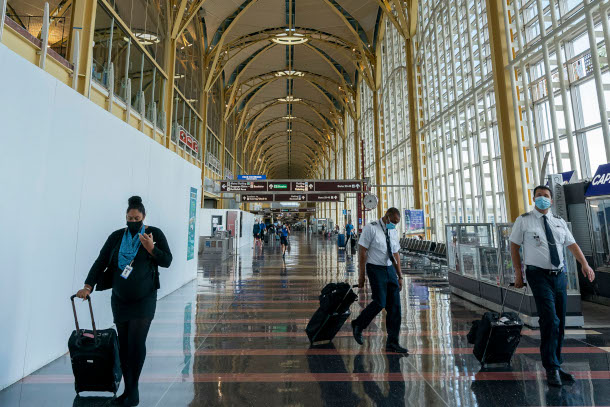
With the proper protective measures, travelers can minimize risk when gathering for the winter holidays. (Photo: Cory Hancock, IMF Photo, Flickr, CC BY-NC-ND 2.0)
BASCOMB: So, in addition to, you know, the $15 Yankee swap gift, should everybody show up with a humidifier to sort of protect themselves?
ALLEN: Well, I like the idea. I'm all for trying to modify our indoor environments to be a little bit healthier. But I'd say before that go with a portable air cleaner, might run you a little more than 15 bucks, but you know, they're not all that expensive. And if they're sized right for the room, they can be very effective. So, you don't need a fancy mechanical system. If you're a few buildings old, and it can't be tweaked very quickly, you buy these things, you can get them at the local hardware store and get them online, everywhere you there, plug and play. Plug them in, turn it on. You could be getting four or five, six air changes per hour when a room might be delivering only half an air change per hour without it.
CURWOOD: By the way, Joe, remind us of how much the amount of virus matters in these situations. Back at the beginning of this, we were told, you know, the more particles the more risk. How accurate is that today?
ALLEN: Well, that's perfectly accurate. And you know, it's a classic Paracelsus, the dose makes the poison. This is it, you want to decrease the viral load. So, we think about that cigarette smoke analogy, you're trying to decrease the amount of smoke or respiratory aerosols in the room, decreases your likelihood of catching this virus. So, I think where the change that's occurred is with the Delta variant is so much more transmissible, meaning that it just takes a little less of that virus to actually cause the infection and it replicates much quicker, people spread it more easily. So that's been the change that has happened over time, one of the hard things to do is we set up controls that we don't exactly know what that dose response is, or what the exact number of virus particles that will cause the infection, but definitely you lower the amount of virus in the air, you lower your inhaled dose, that's gonna lower your risk.
CURWOOD: So, Joe, we're talking to you, today is December 7, and the word Omicron has come into the vocabulary, this variant. And who knows, I mean, by the time people hear this broadcast, we may be talking about yet another variant or… or have more information about Omicron. But people listening to us right now are gonna wonder, okay, what does the Omicron variant do in terms of the advice that you're giving us now?
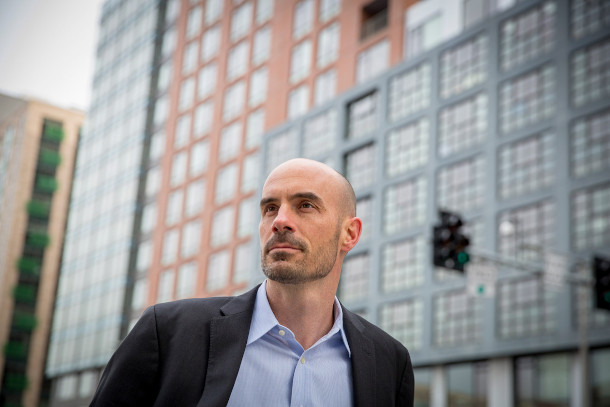
Joe Allen directs Harvard’s Healthy Buildings program. (Photo: Courtesy of Joe Allen)
ALLEN: Yeah, so all eyes on the omicron variant and other variants and so let's talk about it rather than the news that will change kind of every minute, an hour for the next couple of weeks on omicron. Let's talk about these fundamental principles. And the good news is that the fundamental control strategies we've been talking about don't change, they still work. Right? We're talking about the vaccine. That's still going to protect you from severe disease and death. And certainly, you should get boosted. We're talking about the basics of ventilation and filtration, you're removing that virus from the air. That's basic fundamentals. Masks work just the same, right? This omicron, just like delta, just like alpha, and just like the original strain, all travel in respiratory aerosols, that are of different sizes. So, we're talking about basic physics here, you capture it in a mask, you cleaned it out of the air through ventilation, the vaccine and boosters will protect against severe disease and death. And I think what changes is the likelihood of these things happening. Yes, it looks like maybe the likelihood of catching it will be different, the likelihood of a breakthrough infection will change. But these… these fundamentals of risk reduction through reducing inhalation dose is what we're talking about. That holds and that's tried and true. That gets back to decades of control strategies that myself and others have been putting in a building to keep people safe.
CURWOOD: Bottom line, we should be celebrating this holiday season, because it's way different from the one we had before with no vaccines. N’est pas?
ALLEN: No doubt. And I'm glad you said that, Steve, because right, this is not going, no matter what happens, we're not going back to where we were two years ago. I'm really looking forward to the holidays. I have three little kids. I’m gonna be traveling to see family, and we can do it safely. We know what to do. We have the tools. This is not February 2020 where everyone's running around trying to figure out what this novel virus is. How do we control it, who is infected, are old people more impacted, are young people more impacted? We know a lot more. We are in a much much, much better space. The tools are there. People just have to use them.
CURWOOD: Joe Allen directs the Healthy Buildings Program at the Harvard TH Chan School of Public Health, where he's also an associate professor of, what exactly, Joe, you have a very fancy title?
ALLEN: Yeah, the fancy title is professor of exposure assessment science, but really, it's the field of risk assessment, worker health and safety, trying to identify hazards in the built environment and how we control them because we know how to keep people safe in buildings.
CURWOOD: Thanks a lot, Joe, and happy holidays.
ALLEN: Happy holidays to you too.
BASCOMB: Yes, happy holidays. Thanks, Joe.
Links
Joe Allen’s latest book, Healthy Buildings: How Indoor Spaces Drive Performance and Productivity
Living on Earth wants to hear from you!
Living on Earth
62 Calef Highway, Suite 212
Lee, NH 03861
Telephone: 617-287-4121
E-mail: comments@loe.org
Newsletter [Click here]
Donate to Living on Earth!
Living on Earth is an independent media program and relies entirely on contributions from listeners and institutions supporting public service. Please donate now to preserve an independent environmental voice.
NewsletterLiving on Earth offers a weekly delivery of the show's rundown to your mailbox. Sign up for our newsletter today!
 Sailors For The Sea: Be the change you want to sea.
Sailors For The Sea: Be the change you want to sea.
 The Grantham Foundation for the Protection of the Environment: Committed to protecting and improving the health of the global environment.
The Grantham Foundation for the Protection of the Environment: Committed to protecting and improving the health of the global environment.
 Contribute to Living on Earth and receive, as our gift to you, an archival print of one of Mark Seth Lender's extraordinary wildlife photographs. Follow the link to see Mark's current collection of photographs.
Contribute to Living on Earth and receive, as our gift to you, an archival print of one of Mark Seth Lender's extraordinary wildlife photographs. Follow the link to see Mark's current collection of photographs.
 Buy a signed copy of Mark Seth Lender's book Smeagull the Seagull & support Living on Earth
Buy a signed copy of Mark Seth Lender's book Smeagull the Seagull & support Living on Earth

